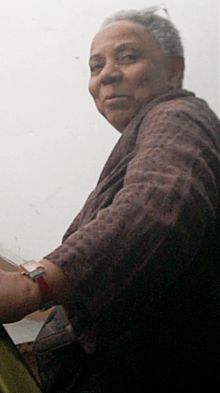Lillian Allen
| Lillian Allen | |
|---|---|
 | |
| Background information | |
| Born |
5 April 1951 Kingston, Jamaica |
| Genres | |
| Occupation(s) |
|
| Instruments |
|
| Years active | 1969–present |
| Labels | Verse to Vinyl |
| Associated acts |
|
| Website |
www |
Lillian Allen (born 5 April 1951) is a Canadian dub poet, reggae musician, writer and Juno Award winner.[1]
Biography
Born in Spanish Town, Jamaica, she left that country in 1969, first moving to New York City, where she studied English at the City University of New York.[2] She lived for a time in Kitchener, Ontario, before settling in Toronto, where she continued her education at York University, gaining a B.A.[3] After meeting Oku Onuora in Cuba in 1978, she began working in dub poetry.[2] She released her first recording, Dub Poet: The Poetry of Lillian Allen, in 1983.
Allen won the Juno Award for Best Reggae/Calypso Album for Revolutionary Tea Party in 1986 and Conditions Critical in 1988.[3] Both albums were produced by Billy Bryans, the percussionist for Canadian dance-pop band Parachute Club.
In 1991 she collaborated on the one-off single "Can't Repress the Cause", a plea for greater inclusion of hip hop music in the Canadian music scene, with Dance Appeal, a supergroup of Toronto-area musicians that included Devon, Maestro Fresh Wes, Dream Warriors, B-Kool, Michie Mee, Eria Fachin, HDV, Dionne, Thando Hyman, Carla Marshall, Messenjah, Jillian Mendez, Lorraine Scott, Lorraine Segato, Self Defense, Leroy Sibbles, Zama and Thyron Lee White.[4] Two years later she organized a collective of artists, including Ahdri Zhina Mandiela and Afua Cooper, prompting Toronto's First International Dub Poetry Festival.[5]:103
In 2006 Allen and her work were the subject of an episode of the television series Heart of a Poet, produced by Canadian filmmaker Maureen Judge. She is a Faculty of Liberal Studies Professor at the Ontario College of Art and Design University, where she teaches creative writing. She recently held the distinction of being the first Canada Council Writer-in-Residence for Queen's University's Department of English. Allen also co-produced and co-directed Blak Wi Blakk, a documentary about the Jamaican dub poet Mutabaruka.[3]
Bibliography
Discography
- Dub Poet: The Poetry of Lillian Allen (1983)
- De dub poets (1985)
- Curfew Inna B.C. (1985)
- Revolutionary Tea Party (1986)
- Let the Heart See (1987)
- Conditions Critical (1988)
- Nothing But a Hero (1992)
- Freedom & Dance (1999)
- Anxiety (European release) (2012)
References
- ↑ "Lillian Allen". thecanadianencyclopedia.com. Archived from the original on 1 September 2011. Retrieved 20 January 2011.
- 1 2 Dawes, Kwame (2000) Talk Yuh Talk: Interviews with Anglophone Caribbean Poets, University of Virginia Press, ISBN 978-0-8139-1946-1, p. 148-160
- 1 2 3 Henry, Krista (2007) "Lillian Allen fights back with words Archived 2011-08-12 at the Wayback Machine.", Jamaica Gleaner, 3 June 2007, retrieved 31 October 2010.
- ↑ "Urban Music". The Canadian Encyclopedia.
- ↑ Robertson, Clive (2004). "Lillian Allen: Holding the past, touching the present, shining out the future". In Householder, Johanna; Tanya Mars. Caught in the Act: An Anthology of Performance Art by Canadian Women. Toronto: YYZ Books. pp. 102–110. ISBN 9780920397848.
- ↑ "Lillian Allen". Poetry Foundation. 11 March 2017. Retrieved 11 March 2017.
- ↑ "Lillian Allen". poets.ca. Archived from the original on 16 March 2011. Retrieved 20 January 2011.